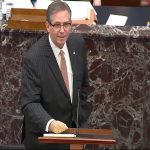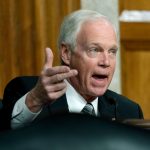Sen. Bob Menendez’s recent indictment on federal corruption charges has upended a number of political institutions, stretching from New Jersey to U.S. policy abroad.
But for one industry, the New Jersey Democrat’s latest brush with the law has presented a unique and alluring opportunity.
Purveyors of precious metals such as gold and silver have jumped on the spotlight afforded to their wares after prosecutors alleged that Menendez accepted gold bars as payment for bribes. (Menendez has denied the charges and pleaded not guilty on Wednesday.)
While gold merchants — ubiquitous on the ad slates of late night cable TV — make sure to note that corruption is bad, they also are trying to put a shine on the Senator’s legal troubles. In keeping gold bars, they argue, Menendez did have a point.
“According to one investing expert, investing in gold and other precious metals is a sagacious step against market instability that most Americans should make now (albeit not through bribes),” the PR firm RLM Public Relations wrote in an email to reporters last week, offering up one precious metals executive to explain why.
That executive, Genesis Gold Group CEO Jonathan Rose, told POLITICO that he believed the “Menendez story has kind of got some people interested more, maybe, in metals — people asking, you know, why did he take a bribe in precious metals.”
He compared the current moment to what happened when reports surfaced that supermodel Gisele Bundchen was asking to be paid in euros rather than U.S. dollars (Bundchen’s representatives denied them at the time).
“I just think in terms of … what gold stands for, it’s a storage of wealth,” he said. But the allure of owning gold doesn’t seem to hurt either: “If you’ve ever held a gold coin or gold bar in your hand, it kind of answers a lot of [those] questions without even talking,” Rose noted. “The attractiveness of gold has always been there.”
The allure of gold as a currency has existed since the age before Christ. And, through much of its history, the U.S. was on a form of metallic standard. The current monetary system, however, is based on paper money with the government providing the full faith and credit for it. But there are persistent calls in certain quarters for Congress to return to a gold or metal standard, arguing that the value of such goods is steady in uncertain times.
Whether that applies to a post-Menendez-indictment world is in the eye of the beholder. Gold bars have reportedly been flying off the shelves at retailers like Costco. But while Rose said the month of September “has kind of been gangbusters” for sales of gold, he believes one-off news stories like the allegations against the Senator are “not really the driving force” for much of his firm’s clientele, many of whom he said roll their retirement accounts over into the gold market.
More influential on the gold market, Rose and another industry executive said, have been the pervasive economic volatility over the past few years and inflation, coupled with the bank collapses of this spring.
“We have seen an uptick [in] demand this week as a result of a market pullback in precious metals prices,” Stefan Gleason, president of Money Metals Exchange, said on Friday. That, he added, followed even higher demand during the spring. “The twin threats of bank failures and inflation provided two good reasons to pull money out of the bank to hold savings in physical gold and silver instead.”
“We don’t think this incident will have any impact on the gold market itself,” Gleason said of the attention being paid to gold bars in the Menendez indictment.
But, he added, “it’s indeed noteworthy that even Sen. Menendez and his wife seem to value payments in gold more than payments in U.S. dollars. They’ve noticed, like so many Americans, that the Federal Reserve Note dollar is being devalued at an accelerated rate, thanks to massive deficit spending and debt monetization by America’s politicians and central bankers.”

















